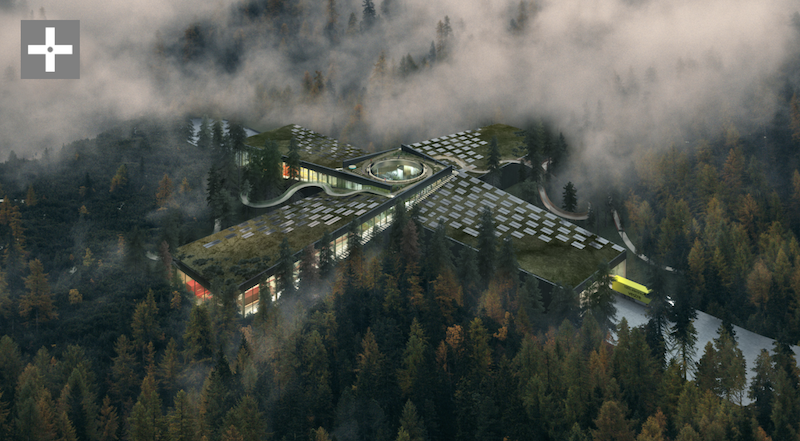BIG, together with Vestre, a Norwegian manufacturer or urban furniture, has unveiled designs for the world’s most sustainable furniture factory.
Dubbed The Plus, the project sits in the heart of the Norwegian forest and is envisioned as a village for a community dedicated to the cleanest, carbon neutral fabrication of urban and social furniture. The nearly 70,000-sf open production facility will double as a public 300-acre park for hiking and camping.
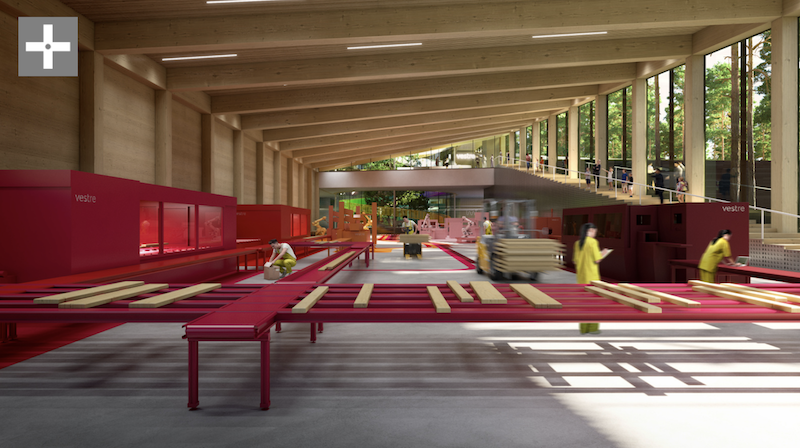
The project is conceived as a radial array of four main production halls – the warehouse, the color factory, the wood factory, and the assembly – that connect at the center, creating the ‘plus’ shape at the intersection. This layout will enable efficient, flexible, and transparent workflow between the manufacturing units. Each production unit will be built with a 21-meter free-spanning, CLT to create flexible, column-free spaces. Additionally, each wing will have one alternating ceiling corner lifted to create inclined roofs that allow views into the production halls and outside to the forest canopies.
See Also: The world’s first building made from carbon-fiber reinforced concrete starts construction in Germany
Located at the center of The Plus is the logistics office and exhibition center. The central hub wraps around a public, circular courtyard where the company’s latest outdoor furniture collections can be exhibited throughout the changing seasons. The plaza doubles as a panopticon for visitors and staff to view the factory’s production processes.
Visitors and staff can hike around the building on all four sides, concluding on the green roof terrace. An ADA-accessible ramp will allow wheelchairs and strollers along the path as well.
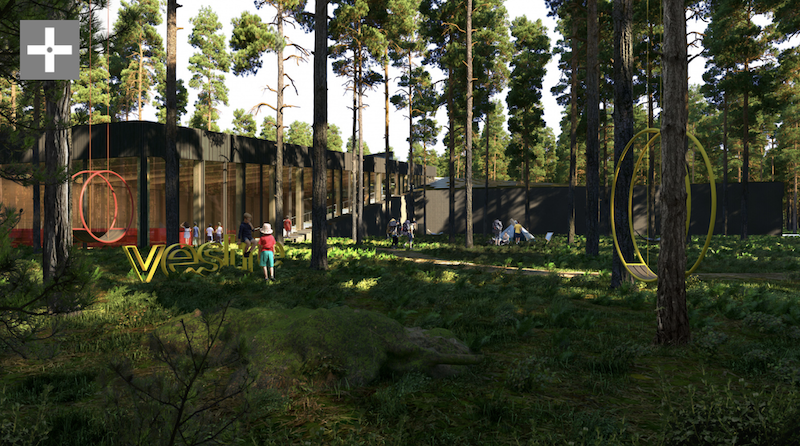
All building materials are being selected by their environmental impact; the facade will be built from local timber, low-carbon concrete, and recycled reinforcement steel. Every aspect of the design is based on principles of renewable and clean energy.
On the rooftop, 1,200 photovoltaic panels help power the factory. Excess heat from these panels is connected to an ice-water system for cooling, heat and cold storage tanks, heat pumps, and energy wells as a storage support system. The system contributes to at least 90% lower energy demand than that of a conventional factory.
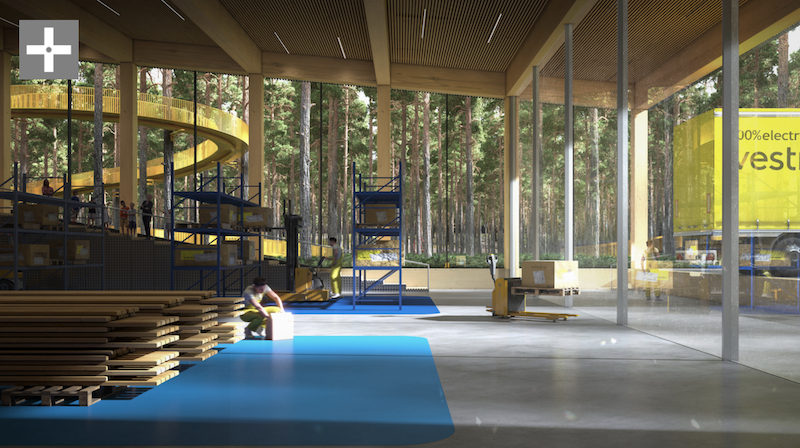
The facility will ensure a minimum of 50% lower greenhouse gas emissions than comparable factories. Due to all of the sustainable design elements, The Plus will the first industrial building in the Nordic region to achieve BREAM Outstanding.
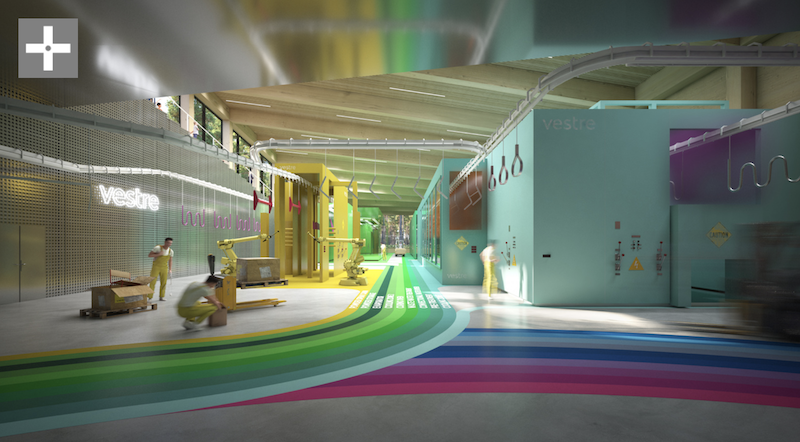
Smart robots, self-driving trucks, and a tablet to manage the entire factory will all be included. Each machine is assigned one of Vestre’s 200 colors, which will spill onto the floors and lead back into the central roundabout. The colorful mapping creates strong visual cues that help guide and explain the workflow of the facility, allowing visitors to easily follow the production process.
The project is currently in progress.
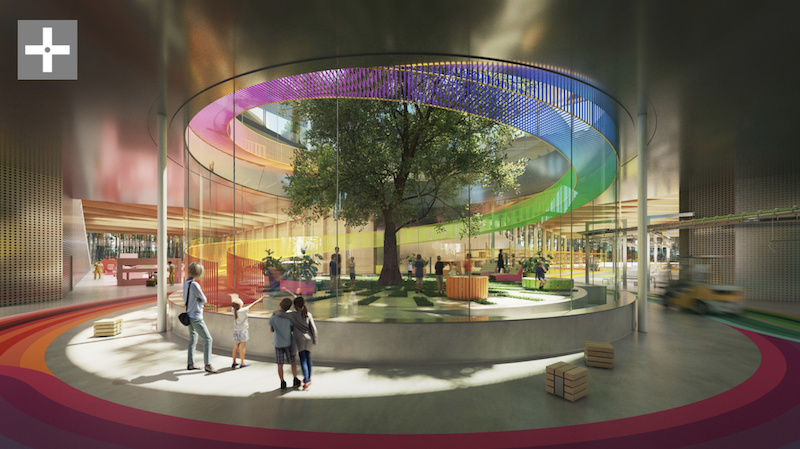
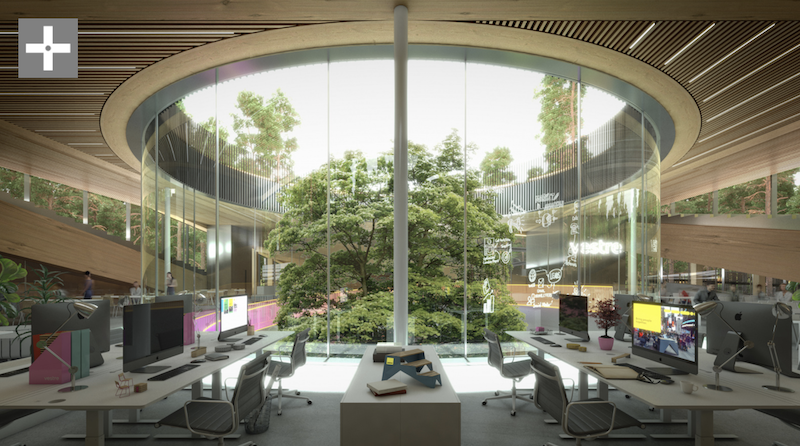
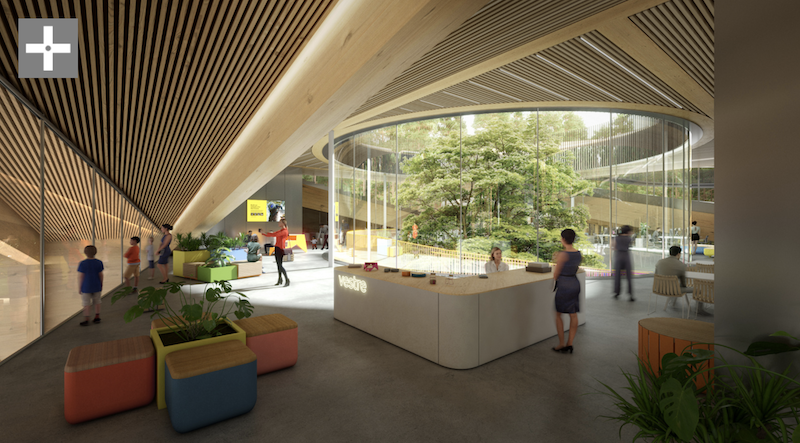
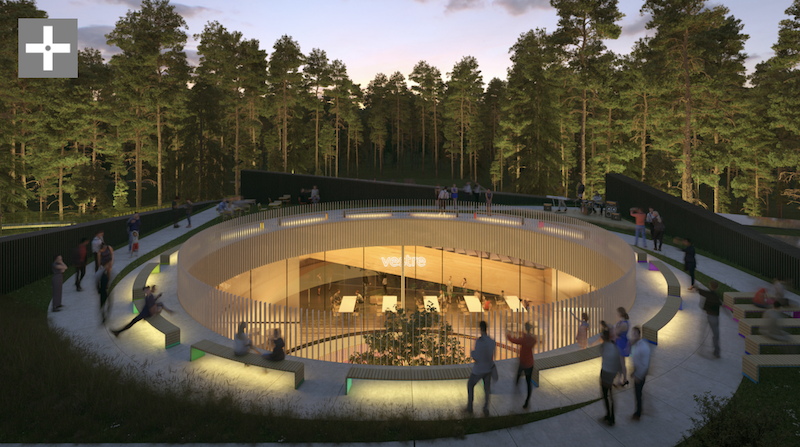
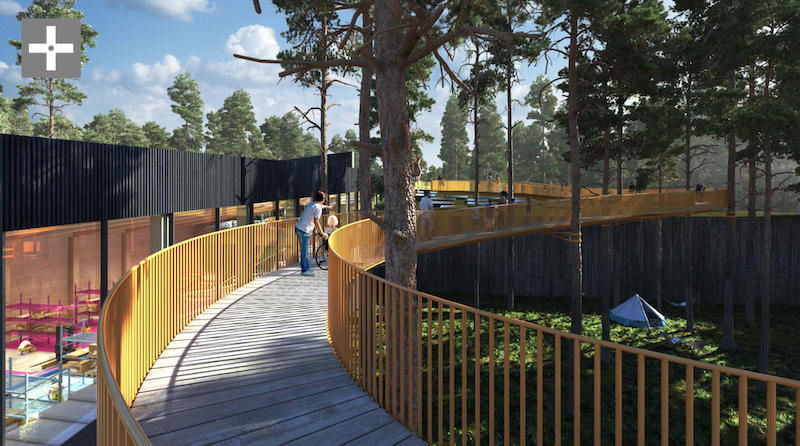
Related Stories
| Aug 11, 2010
SSOE, Fluor among nation's largest industrial building design firms
A ranking of the Top 75 Industrial Design Firms based on Building Design+Construction's 2009 Giants 300 survey. For more Giants 300 rankings, visit http://www.BDCnetwork.com/Giants
| Aug 11, 2010
Best AEC Firms of 2011/12
Later this year, we will launch Best AEC Firms 2012. We’re looking for firms that create truly positive workplaces for their AEC professionals and support staff. Keep an eye on this page for entry information. +
| Aug 11, 2010
Manitoba Hydro Place, Tornado Tower among world's 'best tall buildings,' according to the Council on Tall Buildings and Urban Habitat
The Council on Tall Buildings and Urban Habitat last week announced the winners of its annual “Best Tall Building” awards for 2009, recognizing one outstanding tall building from each of four geographical regions: Americas, Asia & Australia, Europe, and Middle East & Africa. This year’s winners are: Manitoba Hydro Place, Winnipeg, Canada; Linked Hybrid, Beijing, China; The Broadgate Tower, London, UK; Tornado Tower, Doha, Qatar.
| Aug 11, 2010
Nation's first multi-story green industrial facility opens in Brooklyn
The $25 million Perry Avenue Building at Brooklyn Navy Yard is the nation's first multi-level green industrial facility and the first building in New York City to incorporate building-mounted wind turbines. The wind turbines, along with rooftop solar panels, will provide electricity for the building's lobby and common areas.
| Aug 11, 2010
Call for entries: Building enclosure design awards
The Boston Society of Architects and the Boston chapter of the Building Enclosure Council (BEC-Boston) have announced a High Performance Building award that will assess building enclosure innovation through the demonstrated design, construction, and operation of the building enclosure.
| Aug 11, 2010
Portland Cement Association offers blast resistant design guide for reinforced concrete structures
Developed for designers and engineers, "Blast Resistant Design Guide for Reinforced Concrete Structures" provides a practical treatment of the design of cast-in-place reinforced concrete structures to resist the effects of blast loads. It explains the principles of blast-resistant design, and how to determine the kind and degree of resistance a structure needs as well as how to specify the required materials and details.
| Aug 11, 2010
Gensler, HOK, HDR among the nation's leading reconstruction design firms, according to BD+C's Giants 300 report
A ranking of the Top 100 Reconstruction Design Firms based on Building Design+Construction's 2009 Giants 300 survey. For more Giants 300 rankings, visit http://www.BDCnetwork.com/Giants
| Aug 11, 2010
Data center construction costs are down, according to a study by Environmental Systems Design
The current economic crisis has an up-side for owners of mission-critical facilities: On average, it costs less today to construct a new data center than it did in late 2007, according to a study by Environmental Systems Design (ESD). ESD found that the prices of feeder and cable have dropped by more than half, major data center equipment by 12%, labor and materials by 19.6%, and shipping and handling by 15% from the fourth quarter of 2007 to July 15, 2009.
| Aug 11, 2010
Roof board is tough enough for Kia Motors manufacturing plant
For Kia Motors, selecting the right roof board was an important aspect of the company’s $1 billion project to build a new manufacturing plant in West Point, Ga. Kia and its primary roof design expert for the project, All South Subcontractors Inc. of Birmingham, Ala., were faced with many roof board choices, such as asphaltic, mineral fiberboard, plywood/OSB, wood fiberboard, perlite, and paper faced gypsum.


